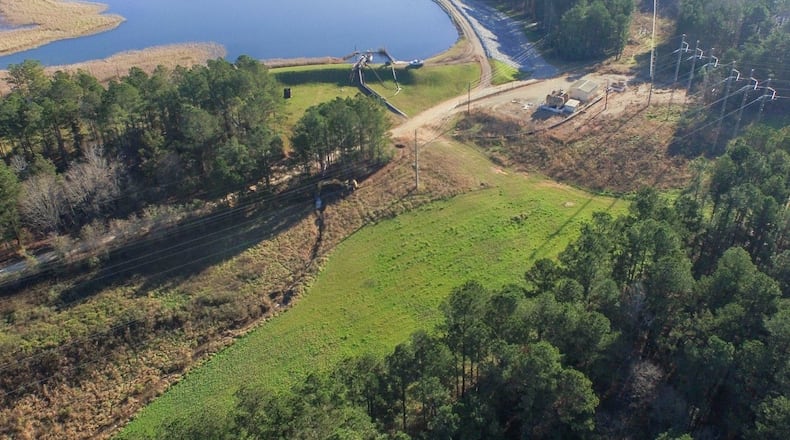Georgia Power has stopped pumping wastewater from a lagoon filled with coal ash into a Milledgeville-area lake, a company spokesman said Friday.
The emergency pumping had gone on for weeks at Lake Sinclair, raising concerns from environmentalists that workers at shuttered electricity Plant Harllee Branch were fouling the popular recreation area with toxins. Advocates also said they were concerned the dams may not have been built to withstand unusually heavy rains.
"We were able to safely lower the water level in our ash pond in compliance with our permit," Georgia Power spokesman Jacob Hawkins said. He said the water was treated, but did not give details. The pumping stopped Jan. 18, Hawkins said, and the company informed the state the next day, said state Environmental Protection Division spokesman Kevin Chambers.
During the pumping, Chambers said tests showed the wastewater was safe and there were no signs of dam failure or that the electricity company violated state laws. However, the plant’s wastewater permit does not require Georgia Power to test for arsenic and other heavy metals found in coal ash that cause cancer.
Plant Branch's man-made ponds store millions of cubic yards of ash, which was produced by the coal fires that burned there for decades. A November Atlanta Journal-Constitution investigation found that Georgia Power's coal ash ponds have a decades-long history of leaks and are prone to spills.
Pumping started Dec. 22, said Altamaha Riverkeeper Jen Hilburn, who discovered it after receiving a tip. Similar pumping in North Carolina prompted that state's regulators to find that Duke Energy broke state law in 2014 when it sent as much as 61 million gallons into a North Carolina canal that fed into the Cape Fear River. Members of Waterkeeper Alliance and other groups discovered the violation.
"Hopefully they'll have it (the ponds) to a level to where it'll be low enough for the rains," Hilburn said of Georgia Power. "My concern is these coal ash ponds that are held up by these rickety dams of rock and dirt are not sustainable in the long term."
The group and other environmental advocates say the safest way to store the coal ash is to move it away from rivers and lakes.
The ponds are built to withstand a 24-hour rainfall of 5.7 inches, according to a 2004 wastewater permit application for Plant Branch. Nearly 11 inches fell in December in Milledgeville. About 2.33 has fallen so far in January, according to the National Weather Service.
About the Author
The Latest
Featured


